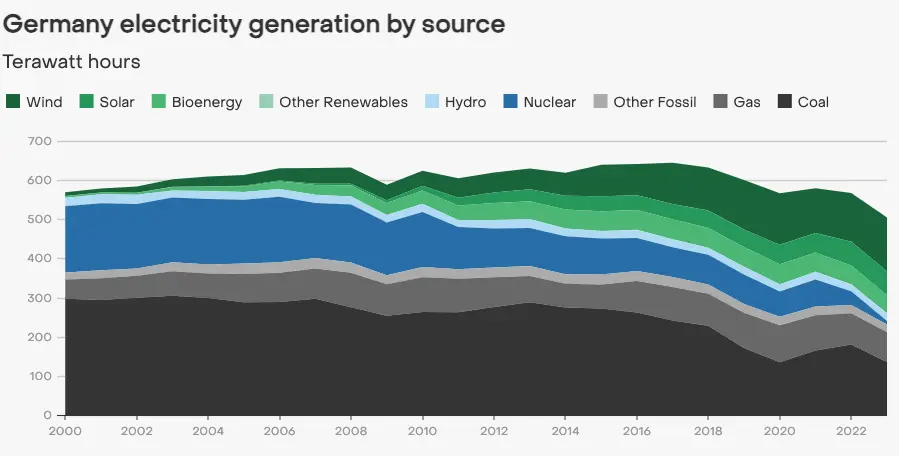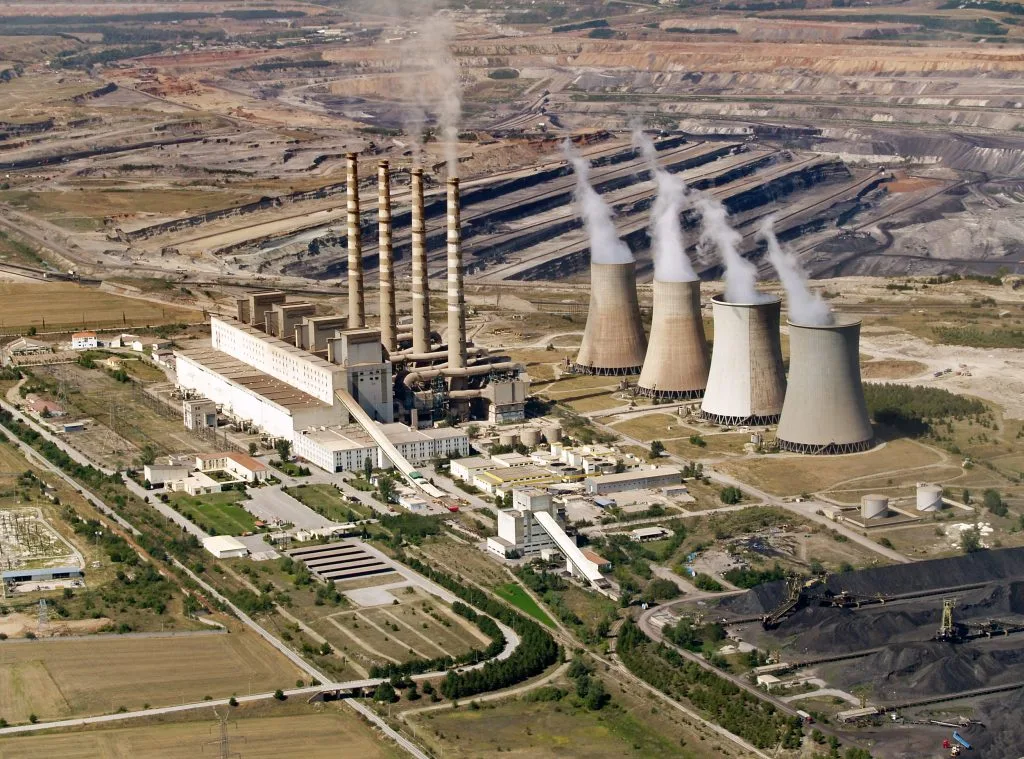Can’t wait to see the articles in 10 years about how major countries are phasing out coal in the next 10-20 years.
Again.
Can’t wait to see the articles in 10 years about how major countries are phasing out coal in the next 10-20 years.
The US still has work to do but have you SEEN the decline in coal use here over the past 15 years? Right now I think the US is back to using the same amount of coal that it did in 1965! As a percentage of energy use it’s at the level it was in 1949!
Coal use in the United States absolutely fallen off a cliff since 2008.
The optimist in me is pumped about those stats, but the cynical pedantic asshole in me wants to point out >0≠0
Mostly I was just commenting on the fact that I keep seeing articles every few years about how some country or other has gone back on its promises to cut X by Y percent.
Thanks for sharing the facts, though! My cynical side needs to see stuff like that to keep it at bay.
The progress isn’t reported on nearly enough and it leaves people feeling cynical and hopeless.
It isn’t just burning coal either as US Production of coal is also down nearly 60 percent from its peak.
I’m still not sure we can get them ALL turned off by 2035 but we are on a clear long term trend-line of coal reduction.
The journey of a thousand miles begins with the first step. We might get there, and we have to start somewhere.
I hope I’m wrong about reading the articles again.
That’s cool, but the Rio 92 Earth Summit happened 16 years prior to 2008.
The whole two steps forward, one step back just hasn’t cut it.
There have actually been a few reversals from major corpos regarding climate change recently. It should be a positive thing, but I just feel like they’re seeing some scary-ass fuckin data. And their revenue predictions are due to take a nosedive when 60% of the population dies from wildfires, flood, famine, and civil strife, and now they’re working to protect their bottom line.
This is actually a new commitment. There have been large-scale cuts to coal uses in several of the countries already, with the UK dropping to near zero.
To add a little colour, the UK has only one left and it’s set to close in the next 6 months.
Between 2012 and 2022 electricity generation from coal has gone down from 2400TWh to 1427TWh for the G7. Most of that comes down to the US, Japan and Germany in that order.The UK and France have basicaly no coal left, besides some rarely running plants and Italy and Canada do exit coal a bit slowler, but do not have too much left anymore.
To look a bit closer. The US has the inflation reduction act and is building out renewables at record pace, while gas is killing coal in most places. The speed in decline is rather rapid. Japan has closed down its nuclear power plants after Fukushima, but is restarting them about now, so a decline in coal consumption is possible. Germany did phase out all its nuclear power plants until last year, but still managed to have a decline in coal electricity generation, due to building out renewables fairly quickly. This means that should go even faster.
So yeah, this might happen. Japan is the one to watch though. It really does not built much clean energy these days.
Lots of coal in the UK
Over the past year coal has only generated 1.2% of power in the UK
We mine and export as well as a large internal household market. Still lots of coal unfortunately, we may have stopped using it for power generation but it’s still being used.
Looks like there’s one mine left operating at any real capacity. ~100,000 tonnes a year.
https://en.wikipedia.org/wiki/List_of_coal_mines_in_the_United_Kingdom#21st_century
Much of that mine’s output is apparently ground down for carbon filters, although it used to be used at a nearby steelworks that I think is now shut.
Domestic use of coal is pretty rare, most people not using gas or electric are using wood burners.
What?
There’s Ratcliffe-on-Soar and that doesn’t run all the time, and very rarely at anything approaching full power. It’s closing for good later this year.
Great to hear that Japan is phasing out coal.
Also replacing a lot of it with sea-shipped LNG which is not significantly better. Possibly not at all better.
Hey I mean tbh at least they’re not actually burning coal, so they don’t have to dig it out of the ground and whatnot. But yeah, sea shipped and lng - not great to be sure
We still need to get rid of all fossil fuels, but LNG is significantly better than coal almost 40% better and that includes life cycle emissions so it includes sea shipping.
 Image attached is UK based and assuming sea shipping to Japan is probably higher than this but it’s not like Japan produces its own coal, so it’s gonna be sea shipping for both of them, so differential wouldn’t change that much you can still expect at least 35% savings on emissions.
Image attached is UK based and assuming sea shipping to Japan is probably higher than this but it’s not like Japan produces its own coal, so it’s gonna be sea shipping for both of them, so differential wouldn’t change that much you can still expect at least 35% savings on emissions.So I would argue ultimate goal should be complete phase out of carbon emissions for sure, but LNG is significantly better than coal.
Your own source specifically says to be wary: “Note that life cycle CO2 emissions depend strongly upon details of supply chains, production techniques, forestry or agricultural practice, transport distances, etc.”
Japan’s coal imports are overwhelmingly local – AUS and Indonesia. So even just on your claim that they are importing either way, the LNG is clearly a significantly worse supply chain. And to be clear, I am not arguing that coal should be their future; they might not have much of a better choice here in the short term, but there’s also nothing to celebrate about switching to gas. They have the tech and know-how for other energy sources. They have opportunities for geothermal, expertise in nuclear, access to plenty of wind/tidal opportunities. I’m not sure how bad their landscape is for solar, though I would be a bit skeptical of any “there’s just no room!” claims for them. Instead, they’re putting huge capital into LNG, committing to longterm use of that product.
Again, nothing to celebrate here.
Besides which, consistently and throughout the product’s history, LNG has had its emissions massively underestimated. I see no reason to suddenly believe we’ve suddenly started getting it right.
The cause of this is a long series of serious, terrible problems in the LNG supply chain from methane leaks at production sites to various leaky infrastructure at surface transportation to leaks at the export/import hubs (not to even mention the enormous energy costs of condensation). These issues that have so far largely gone unaccounted for in estimates that predicted how “diet” the fossil gas would be compared to coal, leading to a LOT of people holding a now orthodox belief that LNG is massively better that is, to say the least, highly optimistic.
When you also factor in things like the goddamn bunker oil used to transport the stuff, all that efficiency is gobbled up.
Anyone serious about climate, at this point, should be operating on the assumption that shipped LNG is no better than coal because the evidence we have that it is better is, frankly, really bad.
Further digging down now, I think you have a point, UK quotes Natural gas that’s uncompressed, LNG will add more on those factors. So howarth LNG assessment probably makes more sense here.
However couple of things that bother me
- Study compares domestic coal and shipped LNG, not sure how reasonable that comparison is
- Japan is not pushing more capital on LNG, their stupidity is jumping directly to hydrogen/ammonia based economy
Also I am not advocating for starting new LNG based plants, any new investment should be towards renewables. But if there is flexibility of shifting loads between existing plants, one should prefer LNG over coal.
Japan’s coal imports are overwhelmingly local – AUS and Indonesia.
That’s roughly as local as France or GB to US east cost, similar distance and similar other differences. IMHO both connections aren’t even regional anymore. But yeah, it’s fairly short what coal import routes concerns.
Me too, though it’s going to take a bunch of on-the-ground action to go from a commitment to an actual phase-out.
The only problem will be the right wingers who complain.
Here in Australia, many trainee pilots actually fly near a coal power plant as part of their first nav training. You can smell it LONG before you’re anywhere near it. I seriously don’t think people realise just how bad Coal is, and how far the pollution stretches for (if they did, they’d immediately change their mind and want to dump it)
I used to live close to a coal power plant in Germany and there were never any smells, so now I wonder don’t they use filters in Australia?
You don’t notice them on the ground. But, up in the air in a light aircraft, you can follow the smell long before you can see the power plant
Well the UK at least has this one sorted.
The last remaining one is a few miles from my house, and is scheduled to be closed in September.
They going to build anything there? Wind/solar and use the grid connection?
Or is this going to be another wood burning thing?
Looks like it will be demolished rather than converted for wood burning.
What they’ll build there is anyone’s guess. I can find articles getting very excited about it being an “energy hub for innovation and business”, which means absolutely nothing, and makes me think they’ve received no concrete offers but want a lot of money for the land…
Yea that’s horseshit.
Bet the land isn’t even that valuable. Old power station land probably not even close to an urban hub. Who wants that?
This is legit the picture they’ve got on their site trying to sell it.

I’m going to guess it ends up being an ASDA warehouse or something.
Edit: I forgot HS2 was supposed to stop right next to it, before it was cancelled. It might have been worth something then. But now it’s just some coal dust polluted land. I’m guessing they’re not going to be allowed to sell it for housing due to that.
Oh the HS2 think maybe could have done something good. Might have been worth removing tonnes of soil and replacing it with tonnes of soil.
Can’t be remotely as valuable now. HS2 was such a cock up. I’m actually reading a book about railways. Fuck could the Victorians get stuff done. Pick and shovel, no messing.
The Group of Seven (G7) is an intergovernmental political and economic forum consisting of Canada, France, Germany, Italy, Japan, the United Kingdom and the United States
I seriously doubt the US’s ability to do this.
So what is Germany gunna do? Just shut down their nuclear plants…
Wind, solar, and storage, which have replaced their nuclear at this point:

It might have been better to roll those out first, and shut down nuclear second, but zero fossil fuels remains doable within a decade.
Sucks for Germany and their recent resurgence of coal plants and decommissioning of nuclear.
With resurgence you mean 33.2% drop in electricity generation from coal between 2022 and 2023 and shutting down 15 coal power plants this year already? Cause that is what is actually happening.
The following list is only the first three pages of a Lemmy search for germany coal:
- Germany begins dismantling wind farm for coal => 8-months ago
- Why Germany ditched nuclear before coal – and why it won’t go back => 4-days ago
- Germany approves bringing coal-fired power plants back online this winter => 7-months ago
- Germany’s emissions hit 70-year low as it reduces reliance on coal => 4-months ago
- Germany to Bring Back Coal-Fired Power Plants => 7-months ago
- Germany primary energy consumption drops by 9.0% and emissions by 11% in Q1-3 compared to 2022 => 6-months ago
- German Primary Energy Consumption drops by 7% in first half of 2023 compared to 2022 => 9-months ago
- Being 100% ideologically aligned with US neocons on foreign policy is forcing Germany to get back to dirty coal => 4-months ago
- Germany Fires Up Extra Coal Unit to Help in Cold Snap => 6-months ago
- Germany approves bringing coal-fired power plants back online this winter => 7-months ago
- Germany Brings Back Mothballed Coal Plants to Help Keep Lights On => 7-months ago
- Germany begins dismantling wind farm for coal => 8-months ago
- Germany: Minister casts doubt on 2030 coal exit => 6-months ago
So yeah, feel free to continue down-voting I guess, but based on what I had to go on, my comment was at least made in good faith.
The list includes:
- Germany’s emissions hit 70-year low as it reduces reliance on coal => 4-months ago
- Germany primary energy consumption drops by 9.0% and emissions by 11% in Q1-3 compared to 2022 => 6-months ago
- German Primary Energy Consumption drops by 7% in first half of 2023 compared to 2022 => 9-months ago
The reason for that is a bunch of coal power plants being kept on the grid to keep the grid stable due to a cut of gas supply from Russia. However a fairly large drop in general electricity consumption, meant that coal electricity generation dropped massively. Also 8 wind turbines are a rounding error for a country like Germany and are easily made up for with new ones built in other locations. So as the Guardian states in the first link:
while coal’s share dropped to 26% from 34%, according to the federal network agency.
There’s also this video from Kurzgesagt (at the 7:56 mark), which oddly enough came up in a playlist and had data that was relevant to a conversation on Lemmy. Of course, the date of the video doesn’t accurately portray what is truly happening, as your figures are obviously newer. I stand corrected.
For the record, I wasn’t doggin’ on Germany. It’s one of the European countries I really want to visit before I log out of life. I took German 101+ in JH/HS, though that was almost 2-decades ago by now. I hope you can see, now, why I had the thoughts I did about Germany’s energy foresight. Take it easy!
^holy ~shit ^I’m high~



